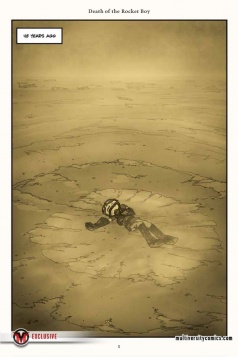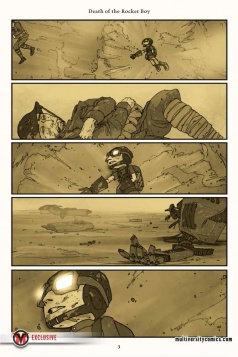
One of the current popular all-ages series currently being released, Royden Lepp’s “Rust” series is about to hit a turning point: we’re about to see the Death of the Rocket Boy.
It’s not all as dire as that, but with the latest volume of the series the story does reach a turning point. Following up from where the previous two volumes left off, our hero Jet Jones finds himself in particular hot water as Oz Taylor currently knows his secret. But as elements of Jones’ lost past come back to haunt him in addition to the oncoming threat from Oz, things get all the more complex.
Read on as we talk about the creation of the series and its current darker context with series creator, Royden Lepp.

Before we get into the latest volume, I want to ask: how has it been working on this series so far? Because from reading it, it generally seems like it was a lot of fun to make.
Roydenn Lepp: Rust is a blast. I wouldn’t be putting years of my life into it if it wasn’t. It’s hard to describe the excitement of letting fans read each installment and hear what they think, what they liked, what confused them. The action scenes are fun but so are the quiet character scenes, which is really important to me.
A lot of all ages books are misconstrued as “kids comics,” but we also look at books like “Bone” or “Amulet” as staples of the genre, where they are literally for all ages. How do you find “Rust” fits in with those kinds of books?
RL: I hope Rust fits on the shelf right next to them. One of the greatest compliments I’ve received on Rust is that it’s ‘true all ages’. Meaning that it’s not all-ages in that it’s simply for kids, but that many adults enjoy just as much. Often adults that don’t even know it’s okay for kids. To me that’s the coolest. I have adult fans that don’t even really realize that it’s all ages and on the other hand I know six year old’s that have told me how much they love it. It has dark themes, it has some sad scenes and even scenes of war. But I don’t believe in talking down to kids or simplifying life for them. I believe some subjects are appropriate and some aren’t, but I try to keep Rust accessible to all.
Is it in any way more difficult to market an all ages series? Given certain prejudices, how have you found that challenge?
RL: I don’t think so. Mainly we (me and Archaia) are not out there saying ‘hey this is a great book for your kids!’. We’re just saying ‘hey this is a great book!’ and yet I still end up talking to kids at schools and libraries, but also lecturing at universities and high schools.
So, previous installments of this series have certainly had a good deal of optimism to them especially in the idea of the lead character alone, but the latest volume is “the Death of the Rocket Boy.” Can you talk a bit about what this means for our hero and his adventures?

RL: Yeah. All of the characters have been dealing with heavy issues throughout the story. Some of those issues are coming to a head in this volume and the consequences of some of the decisions are going to be hard. A lot of people have said ‘Oh no, Death of the Rocket Boy? Is this the end?’ But this is a four volume series and it’s good to read it with that in mind.
As this is the penultimate book in the series, what led to the decision to veer down an ostensibly darker path?
RL: I didn’t consciously decide that I was going to steer the story into a dark place. I think it was always headed here. I feel like in Rust I’ve always given the reader a lot of credit. I’m trying not to spoon feed ideas and themes, I don’t like to hit the reader ‘on the nose’ as my editor puts it. And I’d like them to take the story seriously, it’s got some serious themes that apply to life. The stories that have effected me the most in my life are the ones that are harder to hear. Meaning that everything doesn’t always turn out the way you want it to. With that said I do believe that readers will ultimately be satisfied when all is said and done.
Continued belowSince this is an all ages book, was there any trepidation in broaching darker subjects?
RL: Not at this point. Like I said, I think that the themes of Rust are accessible to everyone on some level. The older the audience, the more they’ll find and hopefully that makes Rust a story worth coming back to as the audience grows up.
Is it difficult to broach some subjects? How do you find that balance between what is ostensibly “appropriate” for the assumed audience and the larger aspirations you have for the story?

RL: Hm. I honestly don’t know. I go with my gut to begin with, and I trust my publisher and my editor to reign me in if I go off the rails. I don’t believe I will, I’ve edited myself here and there in places. But for the most part, this is who I am so this is what comes out. I have yet to hear from a parent, teacher, or librarian that said they thought that this was too much for their audience. Kids are smart. And I don’t believe that I’m doing anything that is gratuitous.
Having worked on this series for some time now, how do you view your artistic growth, both as an illustrator and a writer?
RL: It’s been huge. Which is hard for a creator. I once had an instructor in film school that suggested that you paint your composition on a canvas in quads. Fill in the quads randomly so that over the course of the painting it won’t be obvious what corner you started in. In this he suggested that an artist improves during the course of a single painting, and I think that can be true. This is especially true with a series like Rust that spans years of my life. One of the most important things though is to not look back. It’s the artist who looks back that is too afraid to move forward or too afraid to present ideas. They always want to wait until they’re perfect. If there’s one thing I’ve learned it’s that there are no perfect stories, and no perfect pieces of art. The best plan is to move forward and continue to learn even if you’re learning with an audience.
What are some things that you’ve learned from working on the series that you wish you knew back in the first volume?
RL: I wish I knew how to design robots a bit better. I’ve really learned how to draw a better robot these days.
It’s probably too early to say, but what can you tease for the future of Rocket Boy and “Rust”?
RL: This latest volume is my favorite in the series. I’m obviously biased, and I do love all the volumes, but this one has scenes and moments that I’ve been eagerly waiting to share with readers. I can’t wait to hear what they think.
“Rust” v3 hits stores this May.



